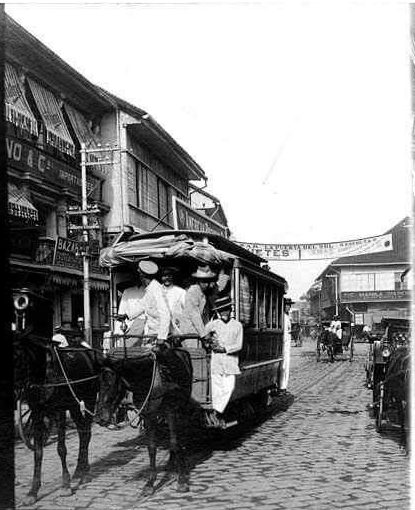A crowded assembly room, with many standing, bore witness to the interest felt in the international peace question by the students of the University of the Philippines, where I spoke to-day. As on the preceding day, my address seemed to give great satisfaction to the faculty.
A ride to Los Banos yesterday was very interesting. The countryside is most picturesque. Town succeeds town in rapid succession. Quaint old churches, with the priests’ houses attached, and the municipal buildings, all sheltered by tropical foliage and surrounding the plazas in the center of these towns, constitute the central feature of interest to the hastening visitor. The homes of the well-to-do are of Spanish architecture, except where a modern type resulting from American occupation has crept in. The houses of the poor are of bamboo frames fastened with bamboo or rattan cords and covered with Nipa. They are exceedingly inflammable, and a friend has told me how, during a fire, she once saw 300 burned up in one hour. They are built on high posts, and beneath the first floors wagons can be stored and children play. Wide windows are opened during the day, and inside can be seen all the family furniture, and life, but at night these windows are closed, resulting in an appalling record throughout the country with respect to tuberculosis. Often a fanciful bamboo fence separates these simple homes from the roadway. Few flowers are seen. Yet even the most indigent have their ideas of decoration. In every coun-try of the world — so it seems to me — the people of all races feel like the French poet who said, “If I had but two sous in the world, with one I would buy bread, with the other a hyacinth, for the hyacinth would feed my soul.” This spirit is discerned throughout the poverty-stricken Orient.
At the Agricultural College at Alabang, we stopped for lunch. Every courtesy was extended to us, and when some of the young men found who I was, they pressed me to address them, promising an improvised company of over 300 listeners if I would talk on peace.
Around Manila the stranger is impressed with the school life of the Philippines. In the city some fine modern buildings devoted to education are most impressive as denoting the possibilities of the American Administration. Out in the country, old school buildings are filled with swarms of happy children who are acquiring a modern education such as their parents never dreamed of. Most of these children speak English. A definite standard of dress and manners is demanded of them. The most astonishing thing is their devotion to American games. Everywhere is that grand old game of baseball played. Even the girls play it. The effect upon the rising generation is marked in many ways. The physical size and mental power of the young people has perceptibly developed, according to statistics and measurements, within the past fifteen years. Baseball takes the place of cock-fights among the young. In driving around the country we often see men fondly holding roosters in their arms, and in groups, evidently discussing the prowess of their pets. You do not see boys preparing for the pastime. People hereabouts inform me that the cock-pits are now almost altogether patronized by the older men. I was told the other day that “even the old men who hold on to their roosters will go to watch a baseball game, and do not indulge in the cock-pit as they used to.” All this speaks loudly in praise of the American educational system.
Sometimes when driving through the country near sundown the villages are alive with little children arrayed in very abreviated costumes — often one garment extending down to their knees. It is enough in a climate where in winter you feel like sitting down whenever you can, and where, at noon-time, repose of several hours is fashionable. These little folks wave their small brown hands at us and in chorus call out “hello” in the purest American accent.
